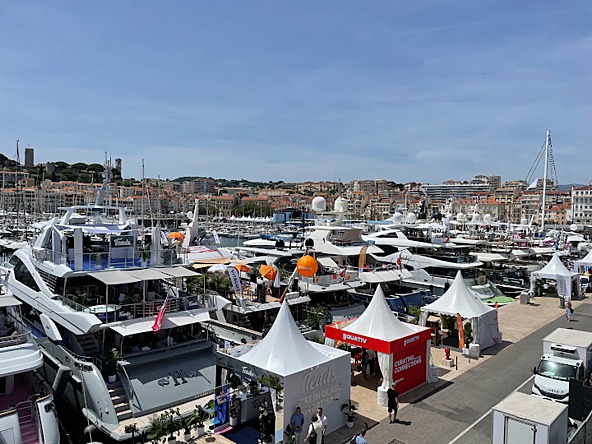A view from Cannes: Insight takeaways from La Croisette

If you want to know what’s occupying the collective consciousness of the advertising and marketing industry from a global perspective, come to Cannes. What’s worrying them? The same as what’s worrying everyone else – what does the future hold? Here, that can be summed in up two words: artificial intelligence.
Contagious’ session How to Win in 2029 played out in entertaining manner to a packed room with standing room only for those desperate to hear one of its 44 – yes it was that specific – pointers on what to expect in the next five years. By my estimates at least a quarter were rooted in AI and could broadly be summed up as: take part, get involved, don’t ignore it because it’s coming for every corner of your lives, whether you like it or not.
If further proof was needed, Accenture Song’s David Droga’s interview with Open AI’s Mira Murati – entitled When AI Challenges and Champions Human Creativity – held in one of the biggest theatres, was turning away almost as many as bagged a seat. While they dug around in the detail of AI and creativity, the upshot was the same, with Murati urging people to “use the tools… and don’t be scared”. And if you’re Elon Musk – the talk of the town both before and after his interview – then there’s a “10-20% probability of something terrible happening” because of AI.
But insight was also piquing the audience’s interest – and this crowd wants its proof, keenly snapping every stats and data slide offered up.
Brands need to get political
The societal changes taking place were the basis of a couple of sessions as presenters discussed how the shifting sands of opinion was impacting brand marketing. Richard Edelman, chief executive of Edelman PR, rattled off stats – such as 60% say they buy brands based on their politics – to support his argument that brands could no longer shy away from political issues, saying: “Silence isn’t an option because silence is a signal – it conveys complicity”. He argued marketers need to change their market research to know where their customers stand on political matters.
Woke does not equal broke
A session entitled Inclusion = income from UN Women, Saïd Business School, University of Oxford and Mondelez teased the first wave of findings from some fascinating research the university has done to support the business case for diversity, equity and inclusion (DEI) activity.
Andrew Stephen, L'Oréal professor of marketing at Saïd Business School, shared details of the initial findings of his study across 58 countries, 392 brands and four years of data looking at whether brands that score well on established metrics for progressive advertising do better commercially.
He found that they did – seeing a 3.46% direct sales uplift and a 6.26% longer term sales uplift. On brand equity measures, there was a 29% increase in loyalty and a 52% lift in pricing power. It was fuel for the counter arguments to the worrying recent reverse on DEI investment from some businesses. The full report will be published in October.
Thinking about the hidden B2B buyers
A joint session from Minjae Ormes, vice-president of marketing, global brand and consumers at LinkedIn and Jamie Cleghorn, senior partner at Bain & Co, dived into the world of understanding your B2B decision-makers and buyers.
Discussing the emotional drivers of B2B buying and the psychology of collective decision-making, Bain’s research showed that the ‘hidden buyers’ in the process – CFOs and CTOs, for instance – care more about reliable brands than target buyers, turning to names they know for peace of mind. So with 81% opting for a brand they already knew at the start of the process, building brands with these hidden buyers is even more important than with target buyers.
The erosion of trust from greenwashing
Ozlem Senturk, senior partner of global sustainable transformation practice, Kantar shared her sustainability views and research within the context of the loss of trust among citizens. Kantar data found that while 90% of marketers see it as their brand’s responsibility to drive transformation, only 40% were proud to tell their sustainability story.
If trust is the currency of change, then greenwashing is eroding that trust – 52% of people said they had seen or heard false or misleading claims about sustainable action taken by brands. This loss of trust has significant commercial consequences, the more people perceive greenwashing the more they stop considering purchasing those products. Sharing a stage with Sebastian Munden, chair of Ad Net Zero, they announced their partnership to launch a sustainability tracker for ads.
Creativity is not enough
And then there was Mark Ritson, provocative and entertaining in equal measure telling his huge crowd that they are “not the consumer, so everything you think is biased”. He dismissed purpose as “hilariously pointless” and creativity as inherently product-oriented when what businesses needed to concentrate on was market orientation and to “turn around and look at our consumers as they truly look at us”.
In the process of dismantling the importance of creativity, he centred back on Jerome McCarthy’s 4Ps of marketing (promotion, product, pricing and place). His ultimate argument was that marketers and brands need to adopt an approach that involved diagnosis – consisting of market orientation, market research and segmentation – then that can feed into strategy, which leads to the tactics required.
Jane Bainbridge is head of content at Pumpkin PR and formerly head of editorial, Research Live and Impact

We hope you enjoyed this article.
Research Live is published by MRS.
The Market Research Society (MRS) exists to promote and protect the research sector, showcasing how research delivers impact for businesses and government.
Members of MRS enjoy many benefits including tailoured policy guidance, discounts on training and conferences, and access to member-only content.
For example, there's an archive of winning case studies from over a decade of MRS Awards.
Find out more about the benefits of joining MRS here.














0 Comments